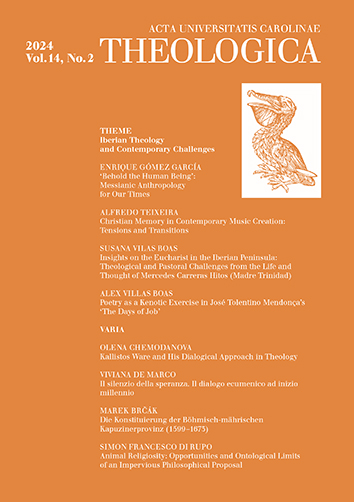AUC Theologica is a peer-reviewed journal for theology published twice a year. As we publish original papers in English, German, French, and Italian, our mission is to serve as a platform both for Czech researchers, who can present their research results in these languages, and for international contributors, who are invited to enter the academic theological discussion in the heart of Europe.
The journal focuses on a wide range of theological disciplines, such as systematic theology, biblical studies, patristic studies, pastoral and spiritual theology, religious education, church history, etc. Within these fields, the journal seeks to reflect the current theological questions and problems, which often requires interdisciplinary approaches. Supporting the intersection of various theological disciplines, we thus also welcome theological papers touching other academic fields including philosophy, sociology, literary studies, and science.
Each issue consists of two sections. The thematic section presents papers of the same focus. The section called ‘Varia’ invites papers dealing with various theological themes from the perspective of all Christian traditions. Our current and past issues are approachable for free on this website in the form of Open Access.
AUC THEOLOGICA, Vol 11 No 2 (2021), 11–31
The Significance of Trinitarian Connotations in Bonaventure’s Epistemology for a Trinitarian Ontology
Jonathan Bieler
DOI: https://doi.org/10.14712/23363398.2022.2
published online: 03. 06. 2022
abstract
Bonaventure’s epistemology is partly based on his Trinitarian theology. This paper investigates the Trinitarian connotations in this epistemology and their broader significance. Like the divine Father, any object of human understanding is liberally generating a likeness of itself: the species. Apprehending the form of the object through this species is an essential feature of human knowledge for Bonaventure. More fundamentally, the human soul itself is structured according to the Augustinian Triad of memoria, intellectus and voluntas, and the transcendentals of being correspond to the human soul’s structure: unum, verum and bonum. Both the human being and the transcendentals of being originate ultimately from the Trinitarian life or actuality, which is a self-relation in truth and love: The Father generates a Word and both together spirate the nexus between Father and Son: the Holy Spirit. Bonaventure’s notion of Trinitarian actuality as it is imaged in the human and being itself can help deepen Aquinas’ metaphysical notion of created esse as the actuality of all acts: An enriched notion of Trinitarian actuality necessarily involves, just as Hugo of St. Victor’s notion of love, a life of personal self-communication and reception, in the context of which the speech of divine ‘suffering’ makes sense, and does not involve mutability. Understanding Trinitarian actuality as the life of love exemplary for creation might open up vistas for a mutual fertilization between Thomistic metaphysics and Bonaventure’s Trinitarian theology, so as to further the development of a Trinitarian ontology without confusing the distinction between Philosophy and Theology.
keywords: Bonaventure; Trinitarian ontology; Epistemology; Species; Transcendentals; Actuality

The Significance of Trinitarian Connotations in Bonaventure’s Epistemology for a Trinitarian Ontology is licensed under a Creative Commons Attribution 4.0 International License.
148 x 210 mm
periodicity: 2 x per year
print price: 100 czk
ISSN: 1804-5588
E-ISSN: 2336-3398
